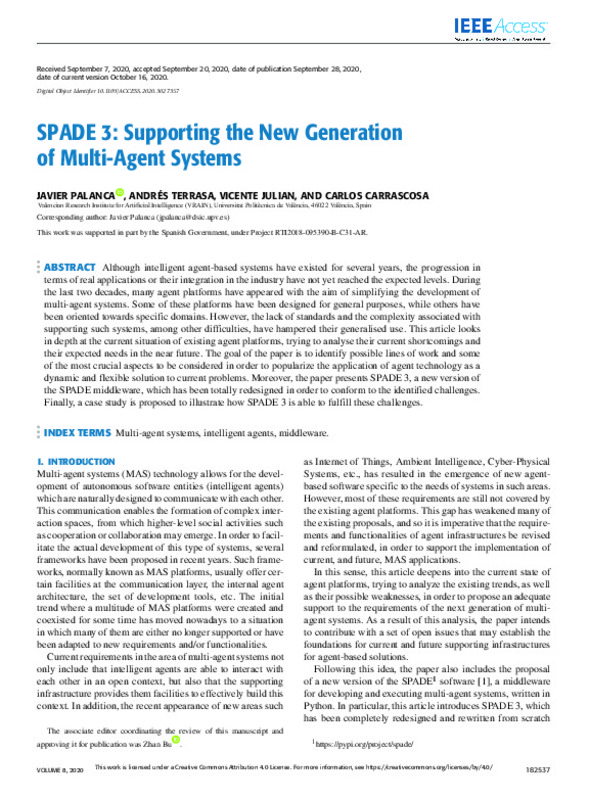JavaScript is disabled for your browser. Some features of this site may not work without it.
Buscar en RiuNet
Listar
Mi cuenta
Estadísticas
Ayuda RiuNet
Admin. UPV
SPADE 3: Supporting the New Generation of Multi-Agent Systems
Mostrar el registro sencillo del ítem
Ficheros en el ítem
| dc.contributor.author | Palanca Cámara, Javier
|
es_ES |
| dc.contributor.author | Terrasa Barrena, Andrés Martín
|
es_ES |
| dc.contributor.author | Julian Inglada, Vicente Javier
|
es_ES |
| dc.contributor.author | Carrascosa Casamayor, Carlos
|
es_ES |
| dc.date.accessioned | 2021-07-02T03:31:20Z | |
| dc.date.available | 2021-07-02T03:31:20Z | |
| dc.date.issued | 2020 | es_ES |
| dc.identifier.uri | http://hdl.handle.net/10251/168686 | |
| dc.description.abstract | [EN] Although intelligent agent-based systems have existed for several years, the progression in terms of real applications or their integration in the industry have not yet reached the expected levels. During the last two decades, many agent platforms have appeared with the aim of simplifying the development of multi-agent systems. Some of these platforms have been designed for general purposes, while others have been oriented towards specific domains. However, the lack of standards and the complexity associated with supporting such systems, among other difficulties, have hampered their generalised use. This article looks in depth at the current situation of existing agent platforms, trying to analyse their current shortcomings and their expected needs in the near future. The goal of the paper is to identify possible lines of work and some of the most crucial aspects to be considered in order to popularize the application of agent technology as a dynamic and flexible solution to current problems. Moreover, the paper presents SPADE 3, a new version of the SPADE middleware, which has been totally redesigned in order to conform to the identified challenges. Finally, a case study is proposed to illustrate how SPADE 3 is able to fulfill these challenges. | es_ES |
| dc.description.sponsorship | This work was supported in part by the Spanish Government, under Project RTI2018-095390-B-C31-AR. | es_ES |
| dc.language | Inglés | es_ES |
| dc.publisher | Institute of Electrical and Electronics Engineers | es_ES |
| dc.relation.ispartof | IEEE Access | es_ES |
| dc.rights | Reconocimiento (by) | es_ES |
| dc.subject | Multi-agent systems | es_ES |
| dc.subject | Proposals | es_ES |
| dc.subject | Middleware | es_ES |
| dc.subject | Tools | es_ES |
| dc.subject | Internet of things | es_ES |
| dc.subject | Buildings | es_ES |
| dc.subject | Solid modeling | es_ES |
| dc.subject | Intelligent agents | es_ES |
| dc.subject.classification | LENGUAJES Y SISTEMAS INFORMATICOS | es_ES |
| dc.title | SPADE 3: Supporting the New Generation of Multi-Agent Systems | es_ES |
| dc.type | Artículo | es_ES |
| dc.identifier.doi | 10.1109/ACCESS.2020.3027357 | es_ES |
| dc.relation.projectID | info:eu-repo/grantAgreement/AEI/Plan Estatal de Investigación Científica y Técnica y de Innovación 2017-2020/RTI2018-095390-B-C31/ES/HACIA UNA MOVILIDAD INTELIGENTE Y SOSTENIBLE SOPORTADA POR SISTEMAS MULTI-AGENTES Y EDGE COMPUTING/ | es_ES |
| dc.rights.accessRights | Abierto | es_ES |
| dc.contributor.affiliation | Universitat Politècnica de València. Departamento de Sistemas Informáticos y Computación - Departament de Sistemes Informàtics i Computació | es_ES |
| dc.description.bibliographicCitation | Palanca Cámara, J.; Terrasa Barrena, AM.; Julian Inglada, VJ.; Carrascosa Casamayor, C. (2020). SPADE 3: Supporting the New Generation of Multi-Agent Systems. IEEE Access. 8:182537-182549. https://doi.org/10.1109/ACCESS.2020.3027357 | es_ES |
| dc.description.accrualMethod | S | es_ES |
| dc.relation.publisherversion | https://doi.org/10.1109/ACCESS.2020.3027357 | es_ES |
| dc.description.upvformatpinicio | 182537 | es_ES |
| dc.description.upvformatpfin | 182549 | es_ES |
| dc.type.version | info:eu-repo/semantics/publishedVersion | es_ES |
| dc.description.volume | 8 | es_ES |
| dc.identifier.eissn | 2169-3536 | es_ES |
| dc.relation.pasarela | S\419474 | es_ES |
| dc.contributor.funder | Agencia Estatal de Investigación | es_ES |








